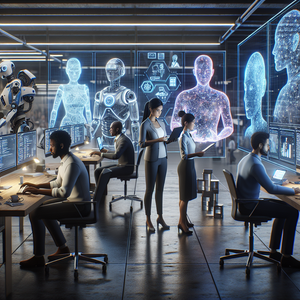Tech-Savvy Staffing: Leveraging AI and Automation

Historically, the staffing industry has relied on manual processes such as sorting through resumes, conducting interviews, and matching candidates with job openings. However, the rapid advancement of technology has introduced more efficient methods, allowing staffing agencies to operate with greater speed and accuracy. AI-driven tools have emerged as game-changers, enabling recruiters to analyze vast amounts of data, identify top candidates quickly, and streamline the hiring process. In the context of high-demand fields, where talent acquisition is increasingly competitive, the ability for staffing agencies to leverage technology can provide a significant advantage. By transitioning from traditional methods to tech-savvy solutions, new agencies can attract clients and candidates alike, ensuring they remain relevant and effective in a fast-changing market.
How AI is Transforming Recruitment
AI algorithms can scan online profiles, job boards, and social media platforms to identify potential candidates that match specific job criteria. For instance, platforms like Hiretual and LinkedIn Recruiter utilize AI to recommend candidates based on their skills, experience, and even cultural fit. This not only saves time but also expands the talent pool beyond the usual channels, enabling staffing agencies to reach passive candidates who may not actively be seeking employment.
Automated Screening Processes
With AI, staffing agencies can automate the initial screening of resumes, filtering out unqualified candidates based on predetermined criteria. Tools such as Pymetrics and X0PA AI harness machine learning to assess candidates' skills and predict their suitability for roles. This allows recruiters to focus their efforts on high-potential candidates, enhancing the quality of hires and expediting the recruitment cycle.
Improving Candidate Experience
Automation can significantly enhance the candidate experience through timely communication and feedback. Chatbots can be employed to answer candidate queries, provide updates on application status, and schedule interviews. For example, organizations like Paradox have developed AI-driven chatbots that engage candidates in real-time conversations, keeping them informed and engaged throughout the hiring process. This not only helps build a positive employer brand but also reduces candidate drop-off rates.
Integrating Automation for Efficiency
Many staffing agencies grapple with administrative burdens like scheduling interviews, managing paperwork, and maintaining databases. Automation tools such as Bullhorn and Workable can help streamline these processes, allowing agency staff to spend more time on strategic activities rather than mundane tasks. This shift can lead to increased productivity and job satisfaction among recruiters.
Data-Driven Decision Making
The power of data cannot be underestimated in the staffing industry. AI systems can analyze hiring patterns, turnover rates, and candidate feedback to provide valuable insights. This data-driven approach empowers staffing agencies to make informed decisions, such as adjusting recruitment strategies or identifying skills gaps in the workforce. For instance, agencies can utilize predictive analytics to forecast future hiring needs and tailor their outreach accordingly.
Enhancing Diversity and Inclusion
AI can also play a pivotal role in promoting diversity in hiring. By removing biases from the recruitment process—like gender or ethnic identifiers—AI-driven platforms can help agencies focus solely on a candidate's qualifications and potential. This can lead to more diverse hiring outcomes and foster an inclusive workplace culture, which is increasingly important to modern job seekers.
Challenges and Considerations
Despite the myriad benefits of leveraging AI and automation, staffing agencies must navigate certain challenges. Concerns about data privacy, the potential for algorithmic bias, and the need for human oversight in the recruitment process are significant. Agencies must ensure compliance with regulations such as GDPR and develop ethical guidelines for AI use in recruitment. Moreover, striking the right balance between technology and human intuition remains crucial to maintaining a personal touch in hiring.
The integration of AI and automation into the staffing industry represents a significant evolution, offering numerous opportunities for aspiring entrepreneurs. By embracing these technologies, new staffing agencies can streamline operations, enhance candidate experiences, and make data-driven decisions that contribute to their growth and success. As the industry continues to evolve, those who leverage tech-savvy solutions will not only stand out in a competitive market but also contribute to the future of work, where efficiency and innovation reign supreme. In a world where the demand for skilled talent is ever-increasing, staffing agencies that harness the power of AI and automation are better positioned to meet the needs of both clients and candidates, ensuring sustainable success in high-demand fields.
AI Recruitment Specialist
Tech startups, recruitment agencies, and large corporations with dedicated HR tech teams
Core Responsibilities
Develop and implement AI-driven recruitment strategies to enhance candidate sourcing and screening processes.
Analyze data from various recruitment platforms to identify trends and improve hiring efficiencies.
Collaborate with IT and HR teams to integrate AI tools into existing recruitment workflows.
Required Skills
Proficiency in AI and machine learning concepts as they apply to recruitment.
Strong analytical skills to interpret data and make data-driven decisions.
Familiarity with recruitment software like Hiretual or Pymetrics.
Diversity and Inclusion Strategist
Fortune 500 companies, non-profits, and organizations focused on social responsibility
Core Responsibilities
Design and implement strategies to promote diversity and inclusion within the hiring process.
Utilize AI tools to identify and mitigate bias in recruitment practices.
Conduct training sessions for hiring managers on inclusive hiring practices and cultural competency.
Required Skills
Strong understanding of diversity metrics and inclusive hiring practices.
Experience with data analytics and AI tools that promote fair hiring.
Excellent communication and interpersonal skills for training and advocacy.
Talent Acquisition Data Analyst
Staffing agencies, corporate HR departments, and tech firms focused on optimizing recruitment
Core Responsibilities
Gather and analyze recruitment data to assess the effectiveness of hiring strategies and processes.
Provide insights and recommendations based on data trends to improve talent acquisition efforts.
Collaborate with HR teams to implement data-driven changes in the recruitment pipeline.
Required Skills
Proficiency in data analysis tools such as Tableau, SQL, or Google Analytics.
Strong knowledge of HR metrics and recruitment KPIs.
Ability to communicate complex data insights to non-technical stakeholders.
Automation Project Manager in Recruitment
Recruitment agencies, corporate HR teams, and firms specializing in workforce technology solutions
Core Responsibilities
Oversee the implementation of automation tools within the recruitment process, from selection to onboarding.
Coordinate between various departments (IT, HR, and operations) to ensure seamless integration of automation technologies.
Monitor the performance of automated systems and suggest improvements based on user feedback.
Required Skills
Project management experience, preferably in a tech or HR setting.
Familiarity with automation tools such as Bullhorn or Workable.
Strong problem-solving skills and the ability to manage cross-functional teams.
Chatbot Developer for Recruitment
Tech companies, recruitment software providers, and innovative staffing agencies looking to improve candidate experience
Core Responsibilities
Design and develop AI-driven chatbots to enhance candidate engagement throughout the recruitment process.
Work with HR teams to identify frequently asked questions and candidate needs to improve chatbot functionality.
Conduct testing and updates to ensure the chatbot provides accurate and timely information.
Required Skills
Proficiency in programming languages such as Python or JavaScript.
Experience with natural language processing (NLP) and AI technologies.
Understanding of user experience (UX) design principles to create intuitive conversational flows.


